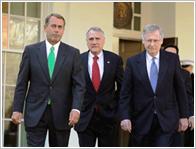GOP on Stimulus: Obstructionism Now, Obstructionism Forever
When it comes to blocking President Obama's economic stimulus plan, what is old is new for the conservative movement. Fearing a permanent Democratic majority if Bill Clinton succeeded in passing his health care reform package, Bill Kristol in 1993 famously rallied Republicans with a memo urging his party to halt it at all costs. With Congressional Republicans and right-wing talking heads now circling the wagons, history is apparently repeating itself. Afraid not that Obama's plan might fail, but that it might succeed, Republicans are mobilizing a scorched-earth campaign to prevent Democratic success on an economic recovery package.
Fresh off the GOP's record-setting obstructionism during the last session of Congress, the mouthpieces of the right are calling for an encore performance. Days before Obama's inauguration, would-be RNC chairman Kenneth Blackwell decried the stimulus proposal, arguing its passage would make "harder for Republicans to retake the White House." Last Friday, Rush Limbaugh recycled Kristol's 1990's message on health care, declaring:
"Obama's plan would buy votes for the Democrat Party, in the same way FDR's New Deal established majority power for 50 years of Democrat rule...Put simply, I believe his stimulus is aimed at re-establishing "eternal" power for the Democrat Party."
While President Obama during a White House meeting Thursday cautioned Republican leaders not to take their marching orders from Limbaugh, by Sunday it was clear they were doing exactly that. Obama's right-wing dinner companions, including Kristol, uniformly denounced his program for the economy. The now former New York Times columnist argued, "Politically, I think the Republicans have more room too argue for changes and ultimately vote against it."
And on Capitol Hill, the Republican braintrust dug in their heels. In the wake of their meeting with Obama, House Minority Leader John Boehner (R-OH) repurposed the GOP's 1990's "no health care crisis" mantra, proclaiming, "Government can’t solve this problem." And John McCain, the vanquished foe Obama went to such great lengths to court, abandoned his brief flirtation with bipartisanship on Sunday. Announcing "as it stands now I can't vote for it," McCain proceeded to ignore voters' overwhelming verdict on Election Day:
"We need to make tax cuts permanent, and we need to make a commitment that there'll be no new taxes. We need to cut payroll taxes. We need to cut business taxes."
That, of course, was precisely the platform Americans rejected in November. President Obama was surely right to remind his Republican guests last week, "I won."
And no doubt, that's a point he needs to keep on making. Unlike George W. Bush, who ramrodded his $1.2 trillion tax cut package through Congress in 2001 despite his clear lack of a mandate to do so, Barack Obama has already bent over backwards to accommodate his Republican opponents. With a two-to-one margin in the Electoral College, a 7 million vote plurality, huge Congressional majorities and unprecedented approval ratings in his back pocket, Obama seems poised to snatch defeat from the jaws of victory.
That concern has been echoed repeatedly by New York Times columnist and Nobel prize-winning economist Paul Krugman. Despite having already incorporated a wide array of tax breaks advocated by the GOP (at the expense of key Democratic initiatives like mass transit funding), President Obama has likely only bought himself further Republican opposition. Call it Krugman's Law: the Republicans can never be accommodated, only defeated.
He made that point clear in his January 5th column which essentially warned Obama that he is bringing a knife to a gun fight:
"Look, Republicans are not going to come on board. Make 40% of the package tax cuts, they'll demand 100%. Then they'll start the thing about how you can't cut taxes on people who don't pay taxes (with only income taxes counting, of course) and demand that the plan focus on the affluent. Then they'll demand cuts in corporate taxes. And Mitch McConnell is already saying that state and local governments should get loans, not aid - which would undermine that part of the plan, too."
Just days later, Krugman worried that President Obama was concerned less with crafting the recovery package the economy so badly needed and instead focused more on garnering broader support among likely irreconciliable Republicans. Arguing "Mr. Obama's prescription doesn't live up to his diagnosis," Krugman pondered:
"Or is the plan being limited by political caution? Press reports last month indicated that Obama aides were anxious to keep the final price tag on the plan below the politically sensitive trillion-dollar mark. There also have been suggestions that the plan's inclusion of large business tax cuts, which add to its cost but will do little for the economy, is an attempt to win Republican votes in Congress."
On Monday, Krugman took his critique a step further, debunking GOP mythology and eviscerating Republican talking points about the Obama plan. In his aptly titled piece, "Bad Faith Economics," he warned the President about the true nature of Republican opposition:
"Conservatives really, really don't want to see a second New Deal, and they certainly don't want to see government activism vindicated. So they are reaching for any stick they can find with which to beat proposals for increased government spending."
Whether President Obama and his team heed Krugman's advice remains to be seen. As for the Republican Party and its amen corner, there is little doubt they are singing from the same hymnal. Put another way, conservatives are on the same page, the one from Bill Kristol's 1993 playbook: obstructionism now, obstructionism tomorrow, obstructionism forever.



Its obvious that nether Republicans or Democrats understand economics otherwise they would both be calling for the eradication of the Federal Reserve. Or they just don't care about the people they trick into voting for them. I think the later is probably true.
The Repugs are like the Terminator. They never stop and they never give up.